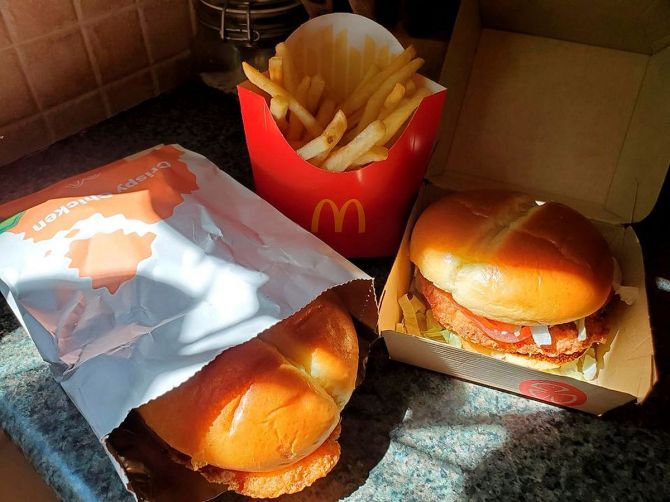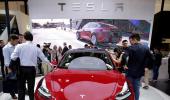McDonald's success menu will see the quick-service restaurant expand its ever-hungry 'foodprint' by doubling the number of joints and increasing its average unit volume by 35-40 per cent in five years.

When Amit Jatia, vice-chairman of Westlife Development (WLDL), which operates fast-food chain McDonald’s in West and South India, wanted to become the American fast-food giant's local partner in 1995, he had to first convince his family he would remain a staunch vegetarian.
As McDonald's - home of the iconic Big Mac - completes 25 years in India, being one of the largest operators in the quick-service restaurant (QSR) segment in the country with over 300 outlets, Jatia has held on to the promise he made to his family.
Not one to sit back and watch anyone flip the Big Mac, he gets straight to the meat of the matter when he says McDonald's success menu will see the QSR expand its ever-hungry 'foodprint' by doubling the number of joints and increasing its average unit volume by 35-40 per cent in five years.
It was in October 1996 that India saw its first McDonald’s restaurant in New Delhi's Vasant Vihar. At first, the brand had two partners in India - Connaught Plaza Restaurants (CPRL), led by Vikram Bakshi looking after the North and East; and Jatia’s Hardcastle Restaurants (HRPL), focusing on the West and South, with whom a deal was signed in 1995.
HRPL is a wholly-owned subsidiary of WLDL.
There are around 480 McDonald’s outlets across the country now, of which 305 are managed by HRPL alone.
With regard to outlets and revenue, Domino's is the leader in the QSR space in India, contributing to 19 per cent of the total QSR outlets and 21 per cent of revenue.
In terms of outlets, Subway dominates an 8 per cent chunk, followed by McDonald’s at 7 per cent.
As far as revenue goes, McDonald’s is still No. 2, with 11 per cent market share, followed closely by Kentucky Fried Chicken (KFC), at 10 per cent.
When asked about the expanding girth of competition, Jatia says, “I believe in brand recall. Our average unit volume is one of the highest in the world.
"The number of restaurants does not bother us. We are not chasing numbers, but top-line growth in India.”
The other major brands in the segment include Café Coffee Day, Pizza Hut, Burger King, Starbucks, Dunkin' Donuts, Costa Coffee, Subway, Taco Bell, Wendy's, Wow! Momo, Jumbo King, Nirula's, and Wat-a-Burger!
Based on a report by Motilal Oswal, the QSR segment in India is expected to grow at a compound annual growth rate of 19 per cent between 2019-20 and 2024-25, moving in line with pre-Covid estimates of Rs 82,500 crore, from Rs 34,800 crore in 2020.
Of this, international fast food brands like Domino’s, McDonald’s, Burger King, KFC, and Subway together account for 45 per cent of the total chains in India.
Jatia says the major challenges McDonald’s faced in India included ensuring the availability of quality raw material (including potatoes), setting up cold chains, and ensuring supply chain during the initial years.
Till 2007, the brand had only 50 outlets in India.
“Pace did not bother us. However, between 2000 and 2002, we did a rethink,” he adds.
The brand has also been never short of controversies as it faced the heat from Hindu nationalist organisations like the Bajrang Dal and the Bharatiya Janata Party for alleged use of beef flavouring in the chain’s French fries.
Activists even ransacked an outlet in Thane.
However, the most recent blowout, which might have had a knock-on effect on the brand's expansion plans in the West and North, was the feud between McDonald’s and Bakshi that kicked off in 2008, when it tried to buy out Bakshi's 50-per cent stake.
Later, it took a legal turn in 2013, when Oak Brook, an Illinois-based company, removed him as managing director of CPRL.
After the dust settled on the legal run-in, McDonald’s bought out its stake in CPRL.
In February last year, Sanjeev Agrawal, chairman of MMG Group, was named partner for North and East India.
Talking about the legal fracas, Jatia says, “Both were two different markets; it had nothing to do with us.
"There was no stake or involvement with us. It had absolutely no impact from our point of view.”
He, however, concedes that growth in the North and West was indeed ‘near zero’ because of the fallout.
Photograph: Hilary Russ/Reuters











